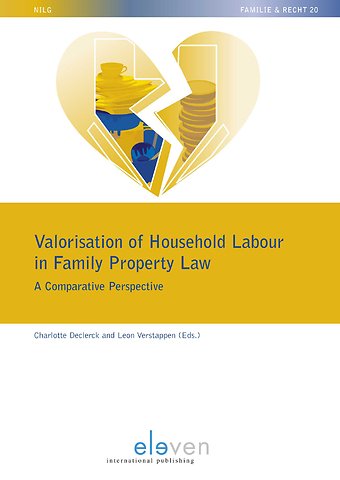



Leon Verstappen is sinds 1 december 1998 hoogleraar privaatrecht, in het bijzonder notarieel recht, verbonden aan de Vakgroep Privaatrecht en Notarieel Recht van de Rijksuniversiteit Groningen.
Meer over Leon VerstappenValorisation of Household Labour in Family Property Law
a Comparative Perspective (PDF-download)
Samenvatting
This book provides a comparative overview of the valorisation and compensation of household labour in property relations between spouses and cohabitants.
Academic experts from Belgium (Prof. Charlotte Declerck and Prof. Ingrid Boone), Germany (Prof. Katharina Lugani), England & Wales (Prof. Anne Barlow), France (Prof. Véronique Bouchard-Barabé), The Netherlands (Prof. Leon Verstappen and Prof. Wilbert Kolkman), Norway (Prof. Tone Sverdrup) and Spain & Catalonia (Prof. Josep Ferrer-Riba) examine the topic from the perspective of their particular legal systems. The book concludes with a comparative analysis from Prof. Leon Verstappen and Prof. Charlotte Declerck.
The Family & Law series broadly focuses on the debate between theory and practice in the field of Family Law. The exchange of knowledge with other disciplines, such as the Social Science, plays an important role. This series is composed of monographs, theses, conference bundles and commentaries. These publications are aimed at lawyers, notaries, judges, academics and officials from the civil registry.
Trefwoorden
Specificaties
Inhoudsopgave
1 Valuation and compensation of household labour in property relations between spouses and cohabitants 11
A Belgian perspective
Charlotte Declerck and Ingrid Boone
I Introduction 11
II Scope of research 11
1 Household labour 11
2 Property relations between spouses and cohabitants 12
III Valuation of household labour under the community of property regime 12
1 First hypothesis: a spouse performs typical household labour and is responsible for the care of the children and any resident third parties 12
2 Second hypothesis: a spouse carries out improvements to goods that belong to the other spouse 13
3 Third hypothesis: a spouse cooperates in the business activities of the other spouse 14
IV Valuation of household labour under the pure separation of property regime 14
1 Household labour as defence against claim for repayment 15
a Obligation to contribute to household expenses (during marriage or cohabitation) 15
b Restitutive gift 17
c Theory on natural obligations 17
2 Unjust enrichment as principle for compensation for household labour 17
a First hypothesis: a spouse cooperates in the business activities of the other spouse 17
b Second hypothesis: a spouse carries out improvements on goods that belong to the other spouse 20
c Third hypothesis: a spouse performs typical household labour and is responsible for the care of the children and any resident third parties 21
3 New legislation? 21
V Valuation and compensation of household labour from a Belgian tort law perspective 22
2 Valorisierung von Haushaltstätigkeit im Güterrecht 27
Eine deutsche Perspektive
Katharina Lugani
I Einführung 27
II Güterstand der Zugewinngemeinschaft, §§ 1363 ff. BGB, und deutsch-französischer Güterstand der Wahlzugewinngemeinschaft, § 1519 BGB i.V.m. Übereinkommen vom 4.2.2010 29
1 Grundzüge 29
2 Motivation des historischen Gesetzgebers: Zugewinn als gemeinsamer Erfolg der Lebens- und Wirtschaftsgemeinschaft beider Ehegatten 30
3 Folgen der Schematisierung 31
a Zugewinnausgleich ohne zu valorisierende Haushaltstätigkeit 31
b Zu valorisierende Haushaltstätigkeit ohne Zugewinnausgleich 31
4 Besonderheiten bei der Beendigung des Güterstands durch Tod eines Ehegatten 34
a Vorgehen bei Beendigung des Güterstands durch Tod eines Ehegatten 34
b Keine Differenzierung nach Tod des potentiell Zugewinnausgleichspflichtigen oder des Zugewinnausgleichsberechtigten 35
5 Wahrnehmung in der Bevölkerung 35
III Wahlgüterstand der Gütergemeinschaft, §§ 1415 ff. BGB 36
IV Gütertrennung 36
1 Allgemeines 36
2 Besonderheiten bei der Beendigung des Güterstands durch Tod eines Ehegatten 37
V Eigentümerstellung nach allgemeinen sachenrechtlichen Regeln 37
VI Nebengüterrecht 38
1 Ansprüche aus Dienst- und Werkvertrag 38
2 Ansprüche nach Ehegatteninnengesellschaft 39
3 Zweckverfehlungskondiktion 39
4 Wegfall der Geschäftsgrundlage 40
VII Besonderheiten bei faktischen Lebensgefährten 40
VIII Fazit 41
3 Valorisation of household labour through relationship and property law 43
Challenging perspectives from England, Wales & Scotland
Anne Barlow
I Introduction 43
II The Common Law Approach and the UK Social Context 44
III England and Wales – The development of the non-discrimination approach 47
1 Married and Civil Partnership Context – England and Wales 47
2 Pre-nuptial Agreements and Non-Financial Contributions 53
8 Valorisation of Household Labour in Family Property Law
IV Scotland 55
V Cohabitation and the law in the UK 57
VI Conclusion 59
4 La valorisation du travail domestique en droit patrimonial de la famille 61
Une perspective Française
Véronique Bouchard-Barabé
I Introduction 61
II La revendication d’une rémunération du travail domestique 62
III L’ aménagement d’ une rémunération du travail domestique 69
1 L’ aménagement contraint 69
2 L’ aménagement choisi 71
5 Valorisation of household labour in family property law 75
A Dutch perspective
Wilbert Kolkman and Leon Verstappen
I Context, objective and research questions 75
1 Dimension of the problem I: Reasons for the choice of strict separation and numbers of such cases 77
2 Dimension of the problem II: Property relations of informally cohabiting partners 77
II Problems and unfair effects 78
1 Size of the problem groups 79
2 Causes of the problems and unfair effects 80
III General conclusion. Justification of legal intervention 80
IV Comparative research 81
1 Comparative research: married couples 81
2 Comparative research: informally cohabiting partners 82
V Instruments considering partners in formal relationships 82
VI Instruments considering partners in informal relationships 83
VII Conclusion 84
6 Valuation of care and housework in property law 85
A Norwegian perspective
Tone Sverdrup
I Introduction 85
II Norway: Household labour is an indirect contribution that leads to co-ownership both in marriage and cohabitation 86
III Comparing legal reasonings 87
1 The Law Commission 88
2 The American Law Institute 88
IV Conclusion: The key difference 89
7 Valuing household work in family property regimes of separation of assets 93
Spanish models and experiences
Josep Ferrer-Riba
I Household work in the regulation of the family economy and family dissolution 93
II Household work and separation of property regimes 96
1 Separation of property regimes in the Spanish legal landscape 96
2 Non-compensatory systems 97
3 Compensatory systems 99
a Deferred remuneration systems 99
b Restitution for excess contribution or unjust enrichment systems 102
c Participation of the housekeeping spouse in the income earner’s gains 108
III Household work and financial remedies at family dissolution 110
1 Financial remedies in the Spanish legal systems: configuration, functions and incidence of household work on their determination 110
2 Complementarity between property and financial remedies to compensate for household work 113
IV Conclusion 114
8 Valorisation of household labour in family property law 117
A comparative overview
Charlotte Declerck and Leon Verstappen
I Introduction 117
II Just matrimonial property systems 118
III Default compensation mechanisms 119
IV Deviation from the default compensation mechanisms 121
V Non-default compensation mechanisms; intervention by the judge 122
VI Conclusion 124
Anderen die dit e-book kochten, kochten ook
Rubrieken
- cadeauboeken
- computer en informatica
- economie
- filosofie
- flora en fauna
- geneeskunde
- geschiedenis
- gezondheid
- jeugd
- juridisch
- koken en eten
- kunst en cultuur
- literatuur en romans
- mens en maatschappij
- naslagwerken
- non-fictie informatief/professioneel
- paramedisch
- psychologie
- reizen
- religie
- schoolboeken
- spiritualiteit
- sport, hobby, lifestyle
- thrillers en spanning
- wetenschap en techniek
- woordenboeken en taal





